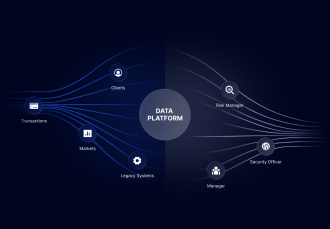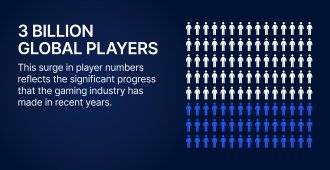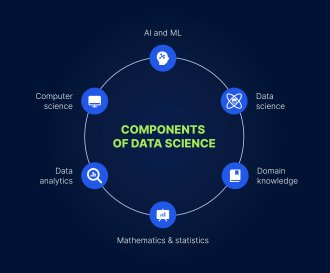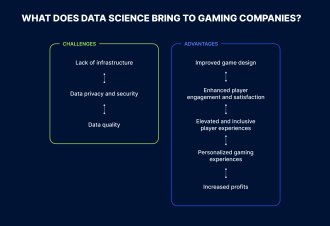
Contact us
Our team would love to hear from you.

According to research by Statista, there are approximately 3 billion global players. Mobile gaming has gained more traction and earns higher revenue than console and personal computer (PC) games combined. The proliferation of devices available to users and the popularization of online gaming have induced companies to embrace data science as a viable instrument for optimized data management. In this article, we explain what data science is, explore its role and applications in the gaming industry, and uncover the benefits and challenges associated with using data science in gaming.


Data science is the study of data, combining principles and practices of mathematics, statistics, artificial intelligence (AI) and machine learning (ML), computer science, domain expertise, and data analytics. The key objective of this discipline is to distill meaning from data and use this information to enhance companies’ decision-making, problem-solving, and strategic planning processes, thereby achieving desired outcomes. Organizations can utilize data science to efficiently process both traditional and big data at every stage of its life cycle, which spans from data gathering to visualization. To empower numerous data science processes and significantly contribute to a deep understanding of data, descriptive, diagnostic, predictive, and prescriptive types of data analytics are employed.


Although data science can add value to any industry, its impact is exceptionally beneficial for gaming. Using gaming data analytics helps enhance various aspects of game development and design to optimize performance, heighten player experiences, and engage more users. In addition, data science solutions enable organizations to study players’ behavior and track their satisfaction by product, segment, and cost-to-serve. This allows companies to develop sustainable strategies for player retention, acquisition, and reacquisition.
Furthermore, analytics for gaming helps businesses increase purchases significantly and hence boost revenue by converting low-revenue earning players into highly profitable ones. To ensure the profound impact of data science on gaming, it’s essential to employ a wide variety of robust tools and cutting-edge technologies. But, what specific applications has data science found in the gaming industry? Let’s find out next.


Furthermore, analytics for gaming helps businesses increase purchases significantly and hence boost revenue by converting low-revenue earning players into highly profitable ones. To ensure the profound impact of data science on gaming, it’s essential to employ a wide variety of robust tools and cutting-edge technologies. But, what specific applications has data science found in the gaming industry? Let’s find out next.
Data science and data analytics open up numerous opportunities for the gaming industry by fueling the following applications:
Leveraging data science in game development supports the creation and implementation of efficient monetization strategies that enable gaming companies to accrue monetary value from players. Through data analytics, game analysts can estimate the likelihood of players purchasing particular in-game items in addition to forecasting player spending patterns. Moreover, guided by data analytics, gaming companies can streamline user funnels based on specific event sequences, identify the most valuable players, and track general playing activity and gaming traffic. Other practical uses of data science to drive game monetization and boost revenue include implementing A/B testing strategies for marketing and optimizing prices to prevent business saturation.
By providing valuable insights, data analytics in the gaming industry facilitates the regular monitoring of multiple key performance indicators (KPIs). KPIs cover all aspects of game performance: quality, player engagement, profitability, bugs, complaints, and more. The most important KPIs that gaming companies monitor include but aren’t limited to daily active users (DAUs), monthly active users (MAUs), average revenue per user (ARPU), average revenue per paying user (ARPPU), in-app purchases, conversion rates, and lifetime. Measuring and understanding these metrics empower developers to continuously iterate various game elements, fostering the game’s success and sustainability and boosting revenue growth.
Running a game data analysis contributes to shaping a well-balanced game economy design focused on meticulously managing in-game mechanisms, currencies, rewards, sources and sinks, and more. The primary purpose of this approach is to create an enjoyable player environment and deliver a frictionless user experience (UX). The steps in establishing a stable game economy include forming the main KPIs of the game, building the correct onboarding player experience, and balancing investment and non-investment resources. Developing an efficient cost system and maintaining the balance between ‘difficult/easy’ and ‘interesting/boring’ phases throughout the entire gameplay are other crucial pillars that significantly impact the establishment of an optimal game economy.
Harnessing tremendous volumes of big data in the gaming industry allows data scientists to build detailed player profiles. These profiles include information, such as player demographics, in-game behavior, interactions with other users, and preferences. By carefully scrutinizing player profiles, it’s possible to customize gaming experiences for individual users, reinforce their engagement in the gaming process, and generate effective personalized marketing strategies targeting multiple players. Powered by data science and data analytics, player profiling fuels recommendation engines and enables the precise tailoring of advertising messages by determining player responsiveness to gaming ads.
Based on mobile game data analytics, data analysts can also accurately predict player churn rates, effortlessly retain dedicated players, and efficiently optimize customer acquisition cost (CAC) to attract new users. Moreover, data science plays a critical role in game chatbot training, resulting in well-trained virtual assistants that can interact with users, handle their requests, and provide ongoing player support throughout game navigation.
We made it possible to empower data-driven insights and advanced analytics for the client’s success.
Real-life applications of data science in gaming involve conducting a meticulous player analysis. By deeply drilling down into datasets and extracting meaningful patterns, data scientists can gain an understanding of players’ perceptions of the game. They can predict purchase behavior and decisions and forecast the player lifetime value (LTV) by following recursive and direct multi-step predictions. These two processes are slightly different. In recursive multi-step forecasting, each new prediction is based on the previous one; however in direct multi-step forecasting, every prediction is independent.
Player LTV forecasting aims to optimize traffic channels and pricing strategies. It’s typically broken down by traffic, source, campaign, and segment. In addition, these predictions aid in evaluating user behavior in the app, estimating player spending over different periods, and segmenting new users based on CAC. Such segmentation not only facilitates the selection of players that will likely generate revenue in the future but also reduces the company’s expenditure on advertising campaigns. Last but not least, video game data analytics integrated with natural language processing (NLP) techniques, drive feedback analysis, which helps track players’ reactions to announcements and releases, identify toxic players, gauge player satisfaction, and pinpoint areas for improvement.
The dynamic and continuously evolving nature and sophistication of fraud attacks is a widely shared concern expressed by multiple gaming organizations. To tackle this complicated problem, mobile gaming analytics comes to the rescue. Through data analytics, companies can swiftly and efficiently address many fraud-related issues. These encompass identifying and preventing suspicious activities, detecting dubious accounts, such as bots and twin accounts, and avoiding identity theft. Moreover, data science plays a vital role in crafting and implementing robust fraud prevention strategies, from identity verification to real-time transaction monitoring.
The gaming industry, having data science in its arsenal and capitalizing on the features of gaming data analytics, such as key metrics analysis, organized data integrity, creating and monitoring event funnels, and preparing discernible reports, is relishing a plethora of benefits.
Integrating data science and data analytics in video games drives an improved understanding of players’ unique preferences and needs, empowering gaming companies to tailor their marketing strategies precisely in line with specific indicators. Adhering to such targeted marketing strategies results in increased conversion rates and the delivery of personalized gaming experiences to users. In addition, it offers improved game design, enhancing player engagement and satisfaction.
Data analysts can easily identify inefficient game elements by thoroughly analyzing player behavior patterns, interactions, preferences, and feedback. Consequently, they can refine these areas. In addition, they can accurately predict future industry trends. These factors all significantly contribute to an elevated and inclusive player experience. Heightened player experience is key to attracting more users, fostering brand loyalty, and boosting in-game purchases. This leads to increased profits and allows gaming organizations to stand out from the competition in the highly dynamic gaming industry landscape.
The advantages that data science brings to the gaming industry are indisputable, setting high benchmarks in terms of game quality and opening up new avenues for customizing player experience. However, a thoughtless reliance on data science for player and gaming data analytics and management can present grave concerns, with data quality being the most pressing issue.
To avoid bias, flawed conclusions, and hence futile decision-making, it’s paramount that gaming companies ensure the high quality of data collected for analytics by selecting only robust and up-to-date datasets. Doing so will help businesses not only extract reliable insights and make informed decisions based on them but also facilitate the creation of efficient gaming strategies and the enhancement of various gaming processes.
Data privacy and security is another critical issue that must be addressed comprehensively, especially given the increasing amounts of personal player data being held. Processing this sensitive data while safeguarding private information requires adhering to multiple compliance and security regulations, for example, GDPR.
Finally, as the volume of player and gaming data is constantly growing, a lack of robust infrastructure is a crucial challenge faced by organizations. It’s imperative to invest in reliable systems that can scale up and expand over time to efficiently handle all the company’s data on an ongoing basis, paving the way for seamless gaming data science and data analytics processes in the future.


The advent and evolution of technological advancements have underpinned the emergence and dissemination of online games, which are now available on a wide range of devices, including mobile phones, laptops, and tablets. As the gaming realm is expected to captivate an increasing number of users daily, capturing all the relevant data requires leveraging modern and scalable solutions, such as data science. While employing data analytics in gaming drives numerous applications and significantly benefits the entire industry, it still has particular challenges. EffectiveSoft’s top-tier data scientists and data analysts know how to capitalize on the right tools to overcome obstacles and deliver tangible results to gaming businesses. Reach out to us now and see for yourselves!

To manage data security in gaming applications, developers should implement robust authentication mechanisms, such as two-factor authentication, to prevent unauthorized access. Encryption should be applied to sensitive user data both during transmission and at rest. Secure coding practices are essential to prevent vulnerabilities such as SQL injection and cross-site scripting. Regular security testing, including penetration testing and vulnerability assessments, ensures that gaming applications remain resilient to emerging threats.
Python and R are widely used for data science in game development due to their extensive libraries and tools for statistical analysis, machine learning, and visualization. Python, in particular, offers libraries like NumPy, Pandas, and TensorFlow, which are essential for data manipulation and predictive modeling. Its versatility and integration capabilities make it a favorite among game developers.
C++ and C# are also significant in game development, especially for real-time analytics and embedding data science functionalities directly into gaming engines like Unity and Unreal Engine. SQL is another essential language for managing and querying large datasets, enabling developers to analyze player behavior and game performance effectively.
On average, small to medium-scale implementations may take 3-6 months, while more advanced systems might take 12-24 months. The time it takes to implement data science in gaming varies significantly depending on the scope, complexity, and goals of the project. Here are some key factors that influence the timeline:
Can’t find the answer you are looking for?
Contact us and we will get in touch with you shortly.
Our team would love to hear from you.
Fill out the form, and we’ve got you covered.
What happens next?
San Diego, California
4445 Eastgate Mall, Suite 200
92121, 1-800-288-9659
San Francisco, California
50 California St #1500
94111, 1-800-288-9659
Pittsburgh, Pennsylvania
One Oxford Centre, 500 Grant St Suite 2900
15219, 1-800-288-9659
Durham, North Carolina
RTP Meridian, 2530 Meridian Pkwy Suite 300
27713, 1-800-288-9659
San Jose, Costa Rica
C. 118B, Trejos Montealegre
10203, 1-800-288-9659